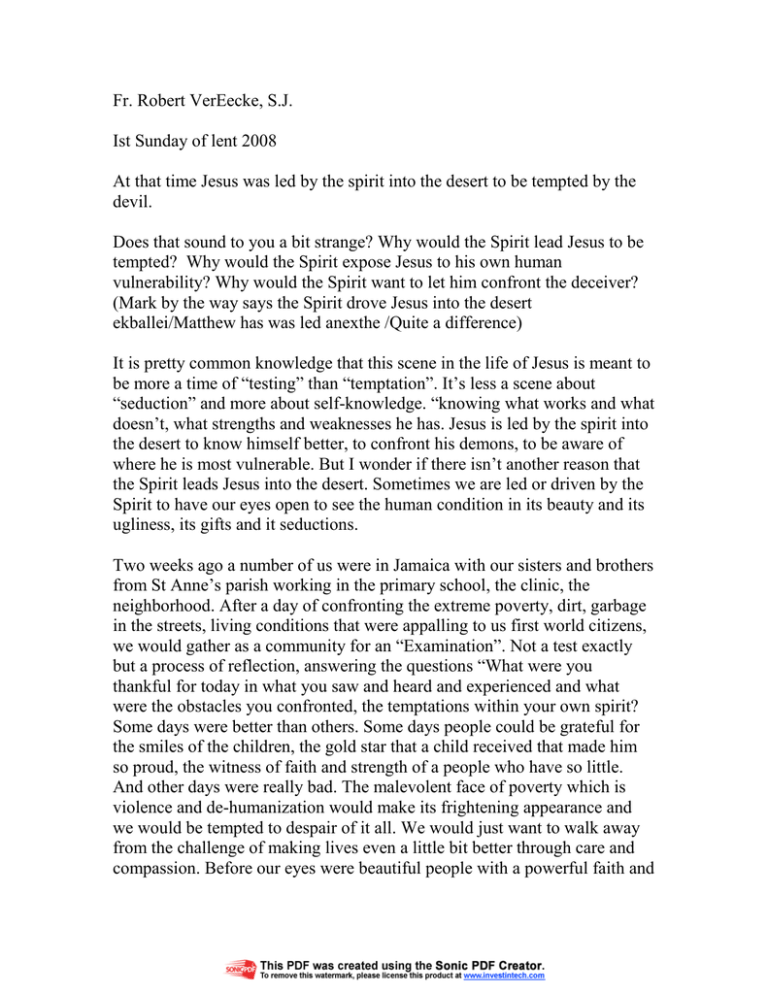Fr. Robert VerEecke, S.J. Ist Sunday of lent 2008
advertisement

Fr. Robert VerEecke, S.J. Ist Sunday of lent 2008 At that time Jesus was led by the spirit into the desert to be tempted by the devil. Does that sound to you a bit strange? Why would the Spirit lead Jesus to be tempted? Why would the Spirit expose Jesus to his own human vulnerability? Why would the Spirit want to let him confront the deceiver? (Mark by the way says the Spirit drove Jesus into the desert ekballei/Matthew has was led anexthe /Quite a difference) It is pretty common knowledge that this scene in the life of Jesus is meant to be more a time of “testing” than “temptation”. It’s less a scene about “seduction” and more about self-knowledge. “knowing what works and what doesn’t, what strengths and weaknesses he has. Jesus is led by the spirit into the desert to know himself better, to confront his demons, to be aware of where he is most vulnerable. But I wonder if there isn’t another reason that the Spirit leads Jesus into the desert. Sometimes we are led or driven by the Spirit to have our eyes open to see the human condition in its beauty and its ugliness, its gifts and it seductions. Two weeks ago a number of us were in Jamaica with our sisters and brothers from St Anne’s parish working in the primary school, the clinic, the neighborhood. After a day of confronting the extreme poverty, dirt, garbage in the streets, living conditions that were appalling to us first world citizens, we would gather as a community for an “Examination”. Not a test exactly but a process of reflection, answering the questions “What were you thankful for today in what you saw and heard and experienced and what were the obstacles you confronted, the temptations within your own spirit? Some days were better than others. Some days people could be grateful for the smiles of the children, the gold star that a child received that made him so proud, the witness of faith and strength of a people who have so little. And other days were really bad. The malevolent face of poverty which is violence and de-humanization would make its frightening appearance and we would be tempted to despair of it all. We would just want to walk away from the challenge of making lives even a little bit better through care and compassion. Before our eyes were beautiful people with a powerful faith and a resilient human spirit. Before our eyes were the horrific consequences of human greed, power and self-worship. The other night many of us were at the Spirit Dinner for Nativity Prep in Jamaica Plain. Listening to the stories of these young students who live in areas not unlike west Kingston with its violence and poverty, we were moved again by the testing of the human spirit in the light of social structures that can be so dehumanizing. We were edified by the determination of these young men to not be caught in the cycle of violence on their city streets and by those graduates who had come back to Nativity to give some of what they had received. This Jamaica and Jamaica Plain experiences have influenced the way that I’m hearing this story of Jesus’ Testing or Temptation. I’ve always thought about it in terms of confronting something in himself, of personal temptation to use his relationship with God to be “more than human”, to play God rather than to be in right relationship with God. But today I’m seeing something else. It’s not just about our individual temptations to be greedy, or powerful or self-centered but what we do with ourselves when we see the social dimensions of greed, of unjust power structures, of a world where God’s vision for all is obscured by “self-interest” of those who want their way at the expense of others freedom. That’s what the Gospel tells us that Jesus had to struggle with. Jesus had to prepare himself for a world that would be greedy, where people would take each other’s daily bread. Jesus had to prepare himself for a world where power would reside in the hands of the military and religious establishment and in the hands of the wealthy few, whether they were Romans or fellow Jews like Herod or high-priests like Caiaphas. Jesus would have to prepare himself for a world where people would take God for granted, domesticate God, bring God down to size. Jesus would have to prepare himself for disciples who wouldn’t understand a God who would want to be as human and vulnerable as they. Rather they would want “god-like” powers as we hear in the story of the first human beings. For us it’s a similar temptation. Can we share the experience of Jesus and choose to live with compassion, struggling for justice and the human rights that each person deserves? Do we have the courage to do whatever we can to change unjust structures of greed and power? If we want to follow Jesus, we may have to be open to wherever the Spirit may lead us!









